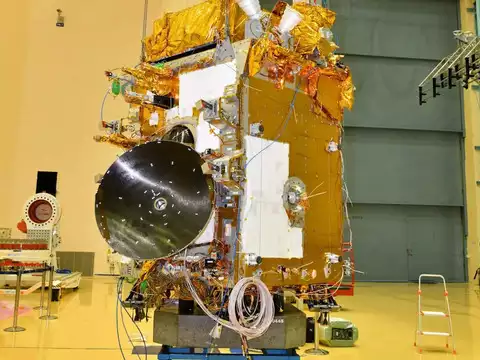

Aditya-L1 is equipped with seven payloads.
Indian Space Research Organisation (ISRO) announced on Monday that it will launch the Aditya-L1 Solar Mission, India’s first space-based observatory to study the Sun, on September 2 from Sriharikota.
ISRO tweeted: “The launch of Aditya-L1, the first space-based Indian observatory to study the Sun, is scheduled for September 2, 2023, at 11:50 Hrs IST from Sriharikota. Citizens are invited to witness the launch from the Launch View Gallery at Sriharikota by registering here: SPACE THEME PARK, SRIHARIKOTA
Commencement of registration will be announced there.”
The spacecraft is expected to be placed in a halo orbit around the Lagrange point 1 (L1) of the Sun-Earth system, which is about 1.5 million kilometres from Earth.
A satellite placed around the L1 point has a major advantage of continuously viewing the Sun without any occultation/eclipses. This will provide a greater advantage of observing the solar activities and its effect on space weather in real time,” ISRO said.
Aditya-L1 will be equipped with seven payloads. Four of these will remotely sense the Sun, focusing primarily on the chromosphere and corona.
Aditya-L1 will be equipped with seven payloads. Four of these will remotely sense the Sun, focusing primarily on the chromosphere and corona, which are the outermost layers of the Sun, using electromagnetic particle and magnetic field detectors. The other three will conduct in-situ observations.
Aditya L1 will look at the Sun continuously hence it can forewarn scientists of imminent solar electro-magnetic effects on Earth. This will help protect our satellites, and other power electrical and communications networks from getting disrupted and help continuing normal operations by operating them in safe mode, till the solar storm blows over.
The Aditya-L1 mission will carry out the study of Solar upper atmospheric (chromosphere and corona) dynamics. Study of chromospheric and coronal heating, physics of the partially ionized plasma, initiation of the coronal mass ejections, and flares. Observe the in-situ particle and plasma environment providing data for the study of particle dynamics from the Sun,” an official statement issued by ISRO said.
“Physics of solar corona and its heating mechanism. Diagnostics of the coronal and coronal loops plasma: Temperature, velocity and density. Development, dynamics and origin of CMEs.
It will identify the sequence of processes that occur at multiple layers (chromosphere, base and extended corona) which eventually leads to solar eruptive events. Magnetic field topology and magnetic field measurements in the solar corona. Drivers for space weather (origin, composition and dynamics of solar wind,” the statement added.
The development comes close on the heels of the Chandrayaan-3 mission making a perfect landing near the unexplored South Pole of the moon in a first for any country in the world.
The Pragyan rover and Vikram lander are now exploring the lunar surface for 14 days to gather scientific data which they are sending back to space agency ISRO. The success of Chandrayaan-3 has made India only the fourth country, after the US, China, and Russia, to have landed on the moon’s surface.
Also read: Watch: Chandrayaan-3’s Prayag rover exploring South Pole of Moon
The Taiwan Economic and Cultural Representative Office in Japan has strongly condemned political interference during…
Gati Shakti Vishwavidyalaya in Vadodara, which has been largely focused on logistics in the railway,…
A delegation of 21 physicians and nurses from Singapore, China, and India met with Bangladesh's…
The India-UK Free Trade Agreement, signed by Prime Minister Narendra Modi and UK Prime Minister…
The Ministry of Health and Family Welfare has achieved a major milestone in women's health,…
Chief of Army Staff General Upendra Dwivedi on Saturday addressed the Kargil Vijay Diwas celebrations…